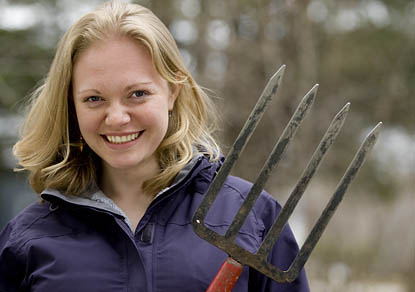‘Students Talkin’ About Food’

The buzzwords fly around the room and no one stops to explain them. “Commodity crops.” “Food web.” “Food miles.” “Victory garden.” “Food aid.” “Monsanto.” “Food security.” No one questions what they mean.
Fifteen Bates students, sprawled on the comfortable couches in Frye Street Union, have gotten together to talk about their food-related academic work. It’s “Students Talkin’ About Food” — a March 25 event that’s part of Nourishing Body and Mind: Bates Contemplates Food, the yearlong campuswide look at issues around food.
Kyra Williams of Shaftsbury, Vt., has focused her senior thesis on refugees farming in the U.S. An American cultural studies major, Williams is researching the New American Sustainable Agriculture Project, which works with Somali Bantu refugees in Lewiston, among other new Americans, to establish farming enterprises.
“The Somalis are really enthusiastic about working with the land and there’s a market for them to do that,” Williams says. “Everyone that I’ve talked to expresses that farming is a part of their culture.”
For her senior thesis, Lucy Neely of Portola Valley, Calif., has examined the economic history of U.S food-aid programs, the largest of which is the U.S. Department of Agriculture’s Food Stamp Program. These programs “have so much potential to create food system change,” she says. But instead, since their inception, they have developed not in the best interests of the people receiving food assistance, but instead in the interests of agriculture — to relieve farm surpluses, for example.
Janneke Petersen ’09 of Lafayette, Calif., is studying the corner store as a source for local produce. She has studied the history of corner stores, largely displaced by supermarkets in the 1950s and ’60s and now enjoying a resurgence, and is considering how that model could both provide healthy local produce in low-income areas and support local business.
In urban areas, the corner store is often the only place to get foodstuffs, Petersen says. With the “white flight” out of downtowns following World War II, supermarkets followed the profit potential to the suburbs. This created “food deserts” in lower-income areas — a lack of nearby stores where families could find affordable fresh produce and other wholesome foods.
“At Bates, if we didn’t have Commons and we had to buy our own food, it’s a long walk to Hannaford,” Petersen says. “You’d probably just go to one of the corner stores near campus, and there’s a pretty low chance that you’d find fresh produce.”
“When you support the supermarket, at the end of the day, most of the money goes to national headquarters,” she says. “When you support locally owned cornerstores, the money stays in the community.”
Sophomore Molly Mylius of Anchorage, Ala., will create an herb garden outside Commons as a part of the internship required of environmental studies majors. This Short Term, Mylius will work with Christine Schwartz, director of dining services, to carve a garden out of a 15×20 plot of land behind the building.
Also during Short Term, Bates students will create a Local Farms Guide. The brainchild of Elise Walsh of Greenwich, Conn., the guide will list farms in and around Lewiston-Auburn, explain what they produce, whether they accept food stamps and whether they offer a Community Supported Agriculture Program.
“That’s really cool,” Petersen tells Walsh. “You know, there’s so many farms. A guide is a really good idea.”
Another student adds, “I was planning to do some photography with food this Short Term — we should talk.”
These are Bates students, talking about food.
— Becca Chacko ’10